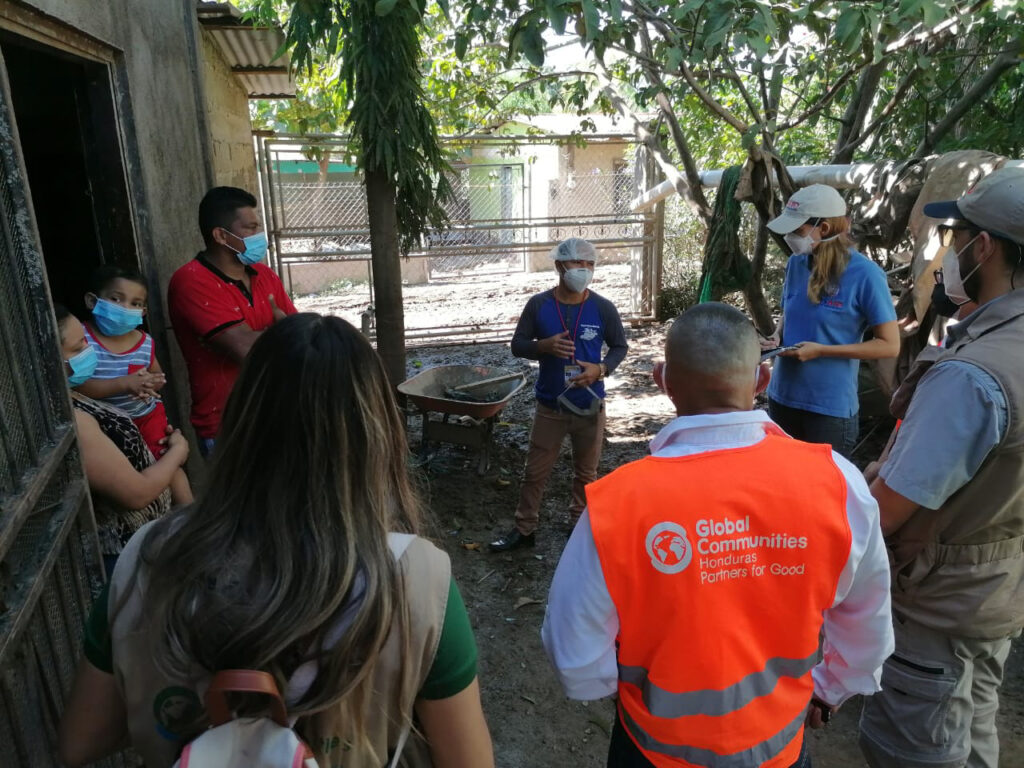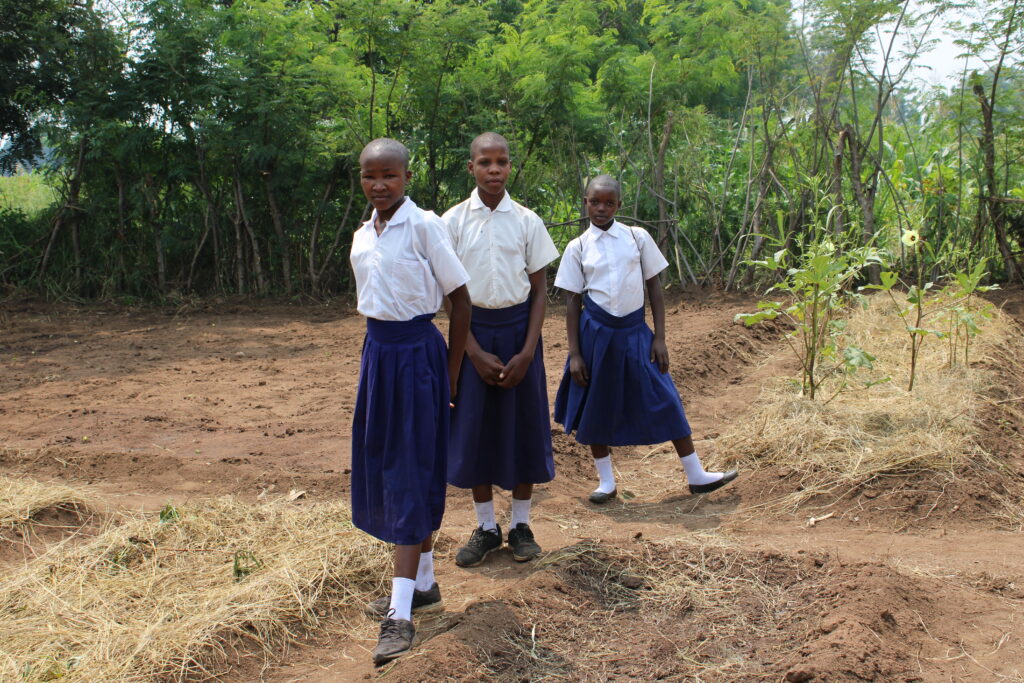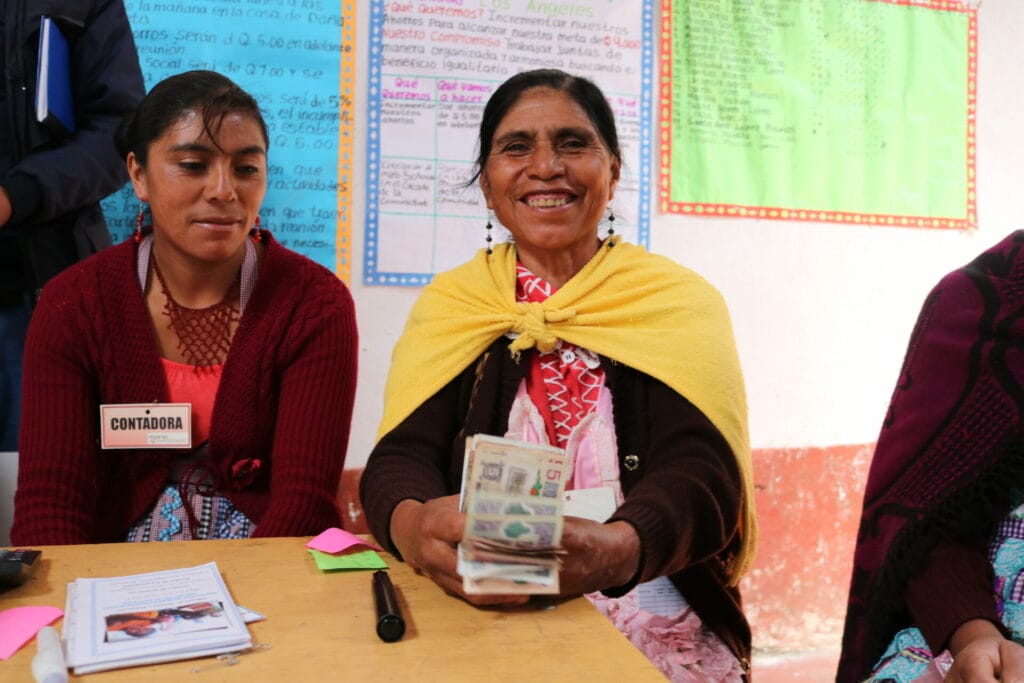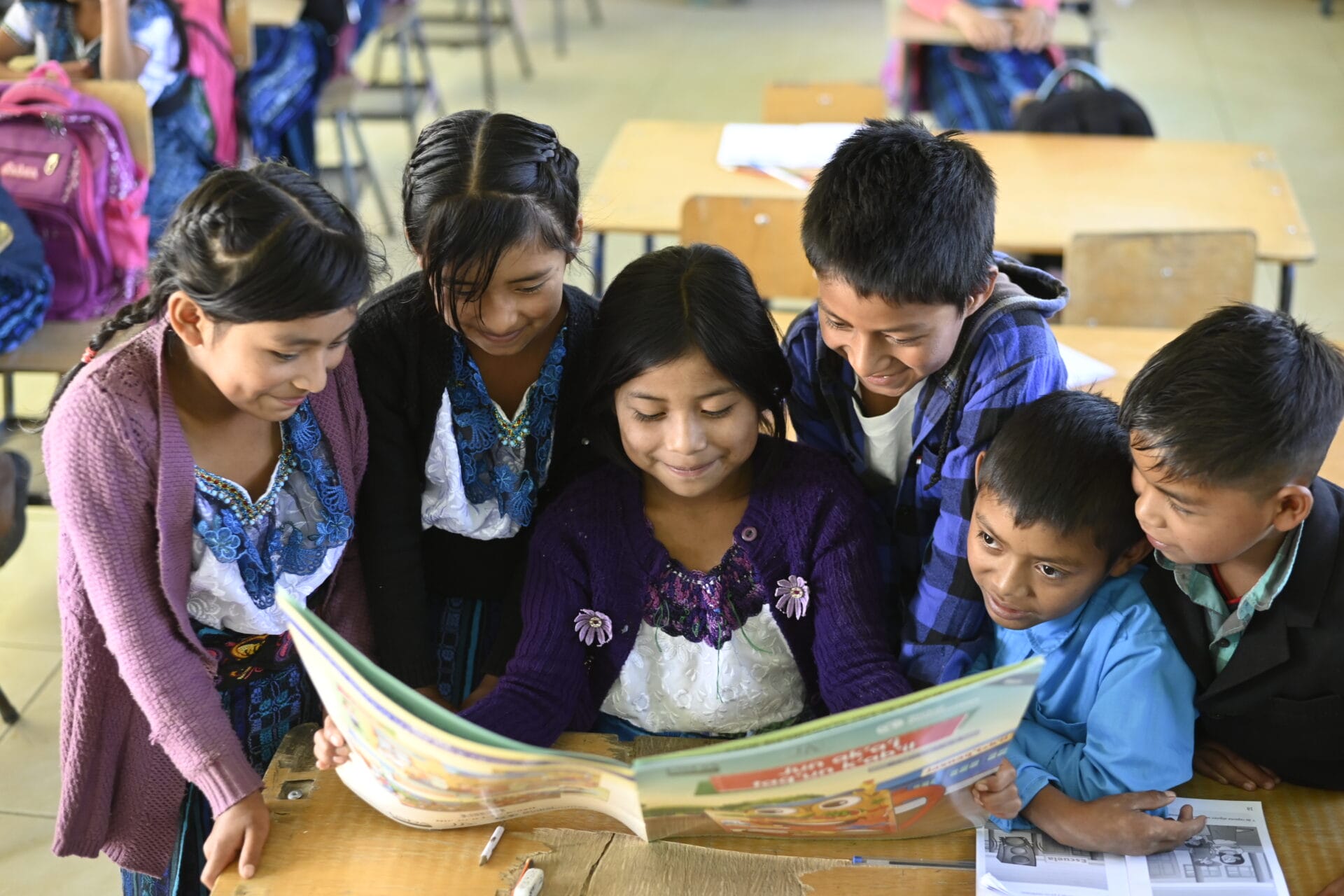1.9+ million
Multipurpose cash assistance distributed to 4,846 families affected by environmental shocks and food insecurity in Guatemala’s Western Highlands
69,851
Students reached through school meals activities as part of the Unidos program
25,000
Women participating in 1,600 Women Empowered groups
As the most populous country in Central America, Guatemala faces a combination of socioeconomic and environmental challenges, including food insecurity, low literacy rates, extreme weather events and health crises. In the Western Highlands region, which is particularly affected by worsening drought, over 75% of the population lives in poverty and two-thirds of children are chronically malnourished.
Global Communities has been partnering with Guatemalan communities to address these challenges and shape stronger futures for over five decades. Working at the intersection of sustainable development and humanitarian assistance in Huehuetenango, Quiché and other departments, our programs respond to disasters, mitigate the effects of climate change on lives and livelihoods, increase student achievement, expand access to WASH and economic opportunity, improve the health and well-being of women and children, and advance gender equality.
The strength of our programs lies in deep partnerships with local actors: from parents, teachers and students to national and local governments, non-governmental organizations, the private sector and local leaders. We work closely with them to implement a wide range of interventions: from increasing access to healthy school meals and forming savings groups to supporting cooperatives and strenghtening disaster risk reduction capabilities. To address the impact of droughts, Global Communities is partnering with municipal governments to create comprehensive water resource management solutions.
They mentioned political and social empowerment, and that resonated strongly in my mind. … I feel very happy because I am learning and understanding ... that communication is freedom and opportunity.
Rosa Marilú García Ramírez de Pichiyá
Villa Nueva, Guatemala
Improving Nutrition and Multilingual Literacy in School-Aged Children
Since 2010, Global Communities has been leading integrated school meals projects in Guatemala with funding from the United States Department of Agriculture’s (USDA) McGovern-Dole International Food for Education and Child Nutrition Program (McGovern-Dole). We implement our current project, Unidos (“United” in Spanish), in partnership with Save the Children, a literacy partner Juárez & Associates, and key governmental and non-governmental actors. Unidos provides daily school meals to preschool and primary school students, improves multilingual literacy in Spanish and Mayan languages (Mam, Q’anjob’al, K’iche’ and Ixil), and ensures that local languages are integrated into the education process.
Unidos works in 14 municipalities across 450 schools. In addition to providing USDA-donated food commodities and purchasing locally grown food, Unidos strengthens the capacity of local actors to ensure sustainability and gradually transition to community-led school meals programs. The program also integrates maternal and child health and nutrition messaging, rehabilitates school infrastructure and helps plant school gardens. To improve the nutritional quality of food at home, Unidos provides take-home food rations for selected participants.
Over the course of the project (2021–2026), 94,522 people will receive direct assistance. This includes 65,344 students receiving daily school meals.
Expanding Access to WASH to Improve the Quality of Life
The Integrating WASH Services (I-WASH) project (2022-2027), funded by the Unites States Agency for International Development (USAID), works to expand access to water and sanitation, with a special focus on Indigenous communities who have been historically deprived of quality WASH services. Global Communities implements I-WASH in 108 communities across 13 municipalities in Huehuetenango and 5 municipalities in Quiché.
Global Communities also works at the national, municipal and community levels to improve water governance and involve women and youth in water management activities. Together with local partners, including the Agua del Pueblo association, Mancomunidad del Norte de Quiché and Mancomunidad Frontera del Norte de Huehuetenango, I-WASH works to strengthen local systems and institutions, professionalize the WASH sector and provide equitable access to high-quality services.
Providing Comprehensive Sexual and Reproductive Health Services for Indigenous Women
Since 2000, Casa Materna (“Mother’s House” in English) has provided care to more than 100,000 Indigenous Mayan and mestizo women with obstetric risks. The program trains community health workers, including traditional midwives, to identify and support women with high-risk pregnancies. The program also uses the Kangaroo Family Care methodology to support infants and their mothers.
In addition to pregnancy and postpartum care, Casa Materna delivers other sexual and reproductive health services, including gynecological care, counseling, family planning, pap smears and cervical cancer screenings.
Advancing Women’s Social and Economic Empowerment through Savings Groups
For more than 10 years, Global Communities has been implementing the Women Empowered (WE) initiative in Guatemala. WE is an integrated economic and social empowerment program which centers around community-based savings groups. WE groups allow their members – typically women – to pool their resources, engage in business activities, and discuss community and social issues. Once operational, WE groups become sustainable, ongoing economic development platforms that are entirely managed by the members.
To date, our program has supported 1,600 WE groups in rural and urban areas of Guatemala, reaching approximately 25,000 participants who have collectively saved 13,712,295 quetzales ($1,776,204). In addition, the groups have issued loans totaling 5,620,803.80 quetzales ($728,083) to support their members’ economic activities.
Before we didn't have anything, only enough to eat and nothing more. But now our funds are growing, and we are giving loans. We are happy. ... I am no longer afraid.
María Etelvina Díaz Carrillo
“Coffee Flower” Savings Group, Guatemala
Promoting Worker Cooperatives for Economic Resilience
Studies suggest that worker cooperatives are more resilient than traditional businesses and more likely to care for their member-owners. They create jobs where employees have a democratic say in business management.
From 2023 to 2028, Global Communities is implementing the Cooperative Leadership, Engagement, Advocacy and Research (CLEAR+) project in Guatemala. Funded through USAID’s Cooperative Development Program (CDP), CLEAR+ promotes the creation of worker cooperatives in non-traditional fields for cooperatives in Guatemala, such as tourism, water systems, domestic services, masonry and construction work. The program aims to create a better environment for cooperatives and enhance the skills and learning opportunities for cooperative members, focusing on Mayan women and youth.
Enhancing Food Security and Resilience in Huehuetenango
In the towns of Colotenango, Jacaltenango and Santa Bárbara in Huehuetenango, Global Communities is implementing the Podemos+ (“We Can” in Spanish) project, with funding from USAID’s Bureau for Humanitarian Assistance (BHA). Podemos+ seeks to improve food security and reduce malnutrition through the 2024 lean season by providing multipurpose cash assistance to 3,675 households. The project focuses on the most vulnerable households, especially those including pregnant women and mothers with children aged five and under. In addition, Podemos+ is creating 20 new savings groups to support women as they save money, invest in productive assets and improve their resilience to disasters.
As part of the HogaRES initiative (“United for Resilient and Healthy Homes"), Podemos+ is also providing concrete floors to 890 families in need of safer housing conditions. HogaRES is a public-private partnership that seeks to improve people's living conditions.
Strengthening Disaster Risk Reduction and Resilience
From 2024 to 2027, Global Communities is implementing the Integrated Disaster Risk Reduction and Resilience (IDR3) project in partnership with the National Coordinator for Disaster Reduction (CONRED). Funded by USAID/BHA, the project aims to strengthen resilience and disaster risk reduction (DRR) capabilities of Guatemalan institutions at the national, municipal and community levels.
At the national level, IDR3 works with the Executive Secretariat of CONRED. At the departmental level, IDR3 strengthens the DRR networks in Alta Verapaz, Guatemala, Huehuetenango and Izabal. At the community level, IDR3 works to establish and strengthen local DRR coordinators (COLRED) and create community DRR plans.
This project also utilizes Global Communities’ transformative WE initiative to create savings groups. WE groups strengthen household economic resilience and help members – especially women – prepare for and respond to disasters.
I was surprised that someone was interested in the community, that there was someone who valued it and that we were considered to work on good things within the community.
Nataly Valerio
Villa Nueva, Guatemala
Recent Programs
Strengthening Disaster Risk Management and Community Preparedness
The SE-CONRED Capacity Strengthening Program (SCSP), funded by USAID/BHA and executed between July 2021 and July 2024, sought to strengthen the capacity of the Executive Secretariat of the National Coordinator for Disaster Risk Reduction (SE-CONRED) and its partners at the municipal and community levels. Global Communities worked with SE-CONDRED to update its DRR policies and establish DRR models in 25 communities at high-risk of socioenvironmental disasters in the Alta Verapaz, Huehuetenango, Izabal and Quiché regions of Guatemala. This included the creation of community DRR plans and maps.
Reducing Disaster Impact and Supporting Economic Recovery
Between June 2022 and December 2023, Global Communities implemented the Podemos (“We Can” in Spanish) project in the municipalities of Aguacatán, Colotenango, Malacatancito and Huehuetenango. Funded by USAID/BHA, Podemos sought to reduce the physical, social and economic impacts of socioenvironmental disasters. The project supported 4,700 at-risk families, including by providing multipurpose cash assistance to households with malnourished children and pregnant women. In addition, Podemos supported economic recovery by forming 150 WE groups.
Podemos also provided assistance to families whose homes were damaged by hurricanes Eta and Iota or heavy rainfall and flooding that made their homes unsafe and undignified. Finally, the project created groups of community volunteers who supported interventions related to protection, gender equality, decision-making in couples and the recommended use of cash.
Advancing Women's Skills and Development
With the support of Gap, Inc. and the Brighter Together Foundation, Global Communities implemented the WE-PACE project between April 2023 and June 2024. The project combined our signature WE methodology with the Personal Development and Professional Empowerment (PACE) methodology to advance the skills and development of women from the Mixco and Guatemala municipalities. We carried out the project in collaboration with local actors, including Fundal, the San Antonio María Claret parish, the Universidad de San Carlos (USAC) School of Social Work, the Neurological Institute of Guatemala and the departmental Directorate of Education. WE-PACE formed 25 WE groups and trained 338 women in communication, problem-solving, decision-making, time and stress management, and WASH.
Enhancing School Infrastructure and Promoting Women’s Empowerment
Global Communities supported the implementation of the Aprendizaje para la Vida III (APVIII) (“Learning for Life” in English) project led by Catholic Relief Services from 2021 to 2024. Funded by USDA, this McGovern-Dole project focused on the municipalities of Momostenango, San Andrés Xecul, San Bartolo Aguas Calientes, Santa Lucía la Reforma, Santa María Chiquimula and Totonicapán, in the department of Totonicapán.
Global Communities used its flagship WE methodology, coupled with the “Clean and Happy” methodology, to promote women’s empowerment, financial inclusion and optimal hygiene behaviors. The initiative formed 90 WE groups involving over 1,000 women. In addition, we performed 190 infrastructure improvements in 58 schools, helping more than 7,000 students access better educational facilities. Through APVIII, the schools received support to build warehouses, remodel kitchens, rehabilitate toilets and implement water projects.
Our Work in Guatemala
Food Systems
Combating Disease, Improving Nutrition, and Ensuring Healthy Mothers, Children and Adolescents
Global Health
Combating Disease, Improving Nutrition, and Ensuring Healthy Mothers, Children and Adolescents
Financial Inclusion
We deliver essential solutions to complex development challenges, resulting in a more just, prosperous and equitable global community.
Resources
Briefs & Case Studies
Mujeres Empoderadas: Innovaciones en la programación de grupos de ahorro
Mujeres Empoderadas en Guatemala se implementó por primera vez en el año 2012, en Huehuetenango. A partir de entonces se ha vinculado a programas de desarrollo y asistencia humanitaria implementados por Global Communities. A la fecha se ha ejecutado en los departamentos de Guatemala, Huehuetenango, Totonicapán, Quiché, Escuintla y Sacatepéquez, alcanzando un total de 42…
Research & Publications
Exploring Health Provider Knowledge of the Undetectable Equals Untransmittable (U=U) Concept in Central America
This poster, presented in 2024 at the 25th International AIDS Conference by IntraHealth International – Global Communities’ subsidiary – highlights the results of an exploratory survey about the knowledge and opinions of health providers in Central America on the Undetectable Equals Untransmittable (U=U) concept. Main finding. Health providers believe that the U=U message can benefit…
Briefs & Case Studies
Cooperative Development (CLEAR+) Program Project Brief
Global Communities’ Cooperative Leadership Engagement Advocacy and Research (CLEAR)+ project (2023-2028), is a USAID funded Cooperative Development Program (CDP) aimed at advocating for the development of worker cooperatives with a focus on youth employment. CLEAR+ promotes the cooperative enabling environment and improved business strategies and performance through local Business Service Providers (BSPs) using a market…
NEWS
Latest stories from the blog

Preparing for Hurricanes from Forecast to Aftermath
As hurricane season barrels into Latin America and the Caribbean each June, communities across the region brace for impact. With an average of 14 named …
Read More
Menstrual Health Is Everyone’s Responsibility — A Global Perspective on Girls’ Education
By Leonel Arguello, Director, Integrated School Feeding Programs, Global Communities Six years ago, I had the opportunity to visit primary schools in rural Tanzania where …
Read More
Five Reasons Why School Meals Matter
School meals are more than just a plate of food; they are the cornerstone of nurturing the next generation in places around the world where …
Read More
Inspiring Women’s Leadership and Resilience in Guatemala
What began as a small pilot project in Guatemala has flourished into a national movement, driving women’s leadership and social and economic participation through community-based ...
Read More
